p]:text-cms-story-body-color-text clearfix”>
I’m at peace with the concept I received’t be visiting area in my lifetime. The price of area tourism is out of attain for me and the overwhelming majority of People. But on a latest Saturday afternoon, due to a mixture of digital actuality and old school theatrics, I’m on the moon.
Trying to my left, I see unusual, abstractly blue lights rising from the grey, rocky moon panorama. Ducking down, I can spot the celebrities and piece collectively numerous constellations. Forward, I watch the automobile I’m standing in — technically a transport container — transfer by way of craters on a monorail.
That is “The Lunar Light: Discovery,” half VR expertise, half mini-escape room, half science experiment and half one-act play. Presently working by way of mid-Might in Santa Monica, “Lunar Light” makes use of a small forged of actors to carry the dream of visiting the moon alive. The VR helps, after all, as our goggles conceal any aspects of the transport container from view, however it’s the performances that set the tone and promote the phantasm. All through, we’ll be tasked with minor actions — mining moon rocks in VR, as an illustration — and the actors will lead, information and provide moon tidbits, all with a little bit of improv-inspired campiness.
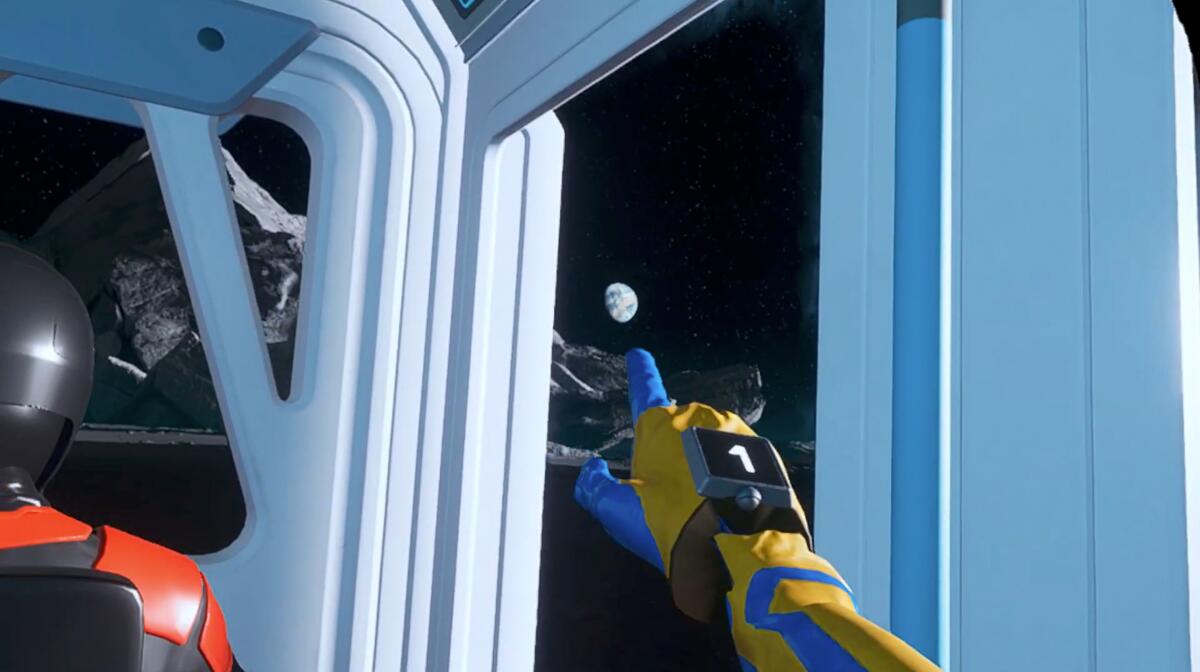
A part of “Lunar Light: Discovery” is in digital actuality, when company can look out digital home windows to see views of area. Above, a screenshot from contained in the headset.
(Courtesy of Lunar Gentle: Discovery)
“Lunar Light” is ready within the 12 months 2055, when humanity has established a small group on the moon. A mysterious blue-hued mineral has landed on Earth’s pure satellite tv for pc, and it’s inflicting unusual reactions — individuals’s feelings are comically off-centered, and energy and lighting appear unpredictable. Even a tiny robotic — DG-33, kind of cutesy spin on a trash compactor — has developed some quirks, specifically a sassy Southern accent.
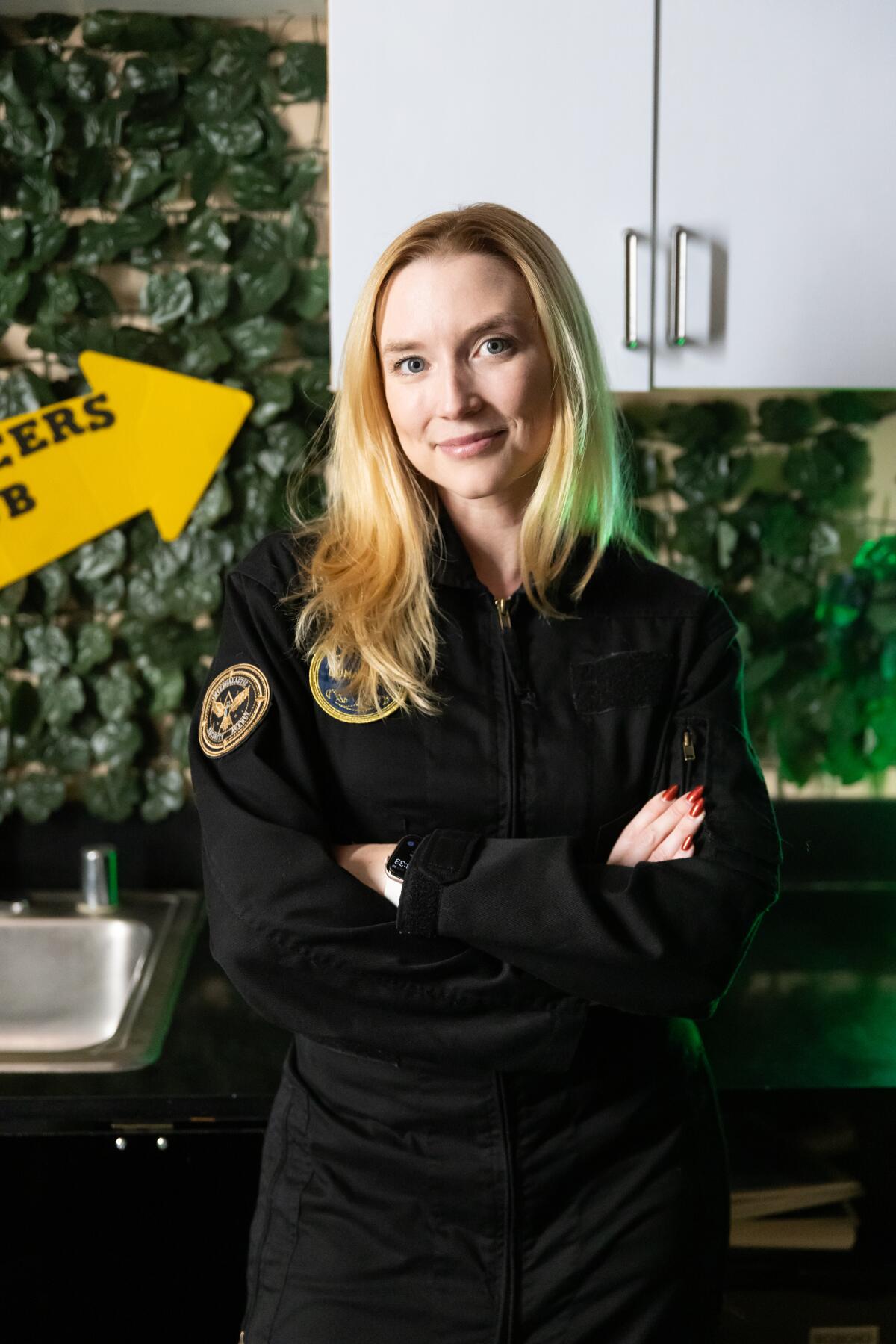
“I do think that space unites people,” says Danielle Roosa, who led the creation of “The Lunar Light: Discovery.”
(Catherine Dzilenski / For The Occasions)
“I realized a lot of my [college] classmates had no idea what NASA was even doing,” says Roosa, 32. “One person said, ‘I thought NASA was out of business.’ The seed was really planted there.”
Or woke up, quite.
“There’s always this conversation, ‘Why space exploration?’” Roosa says. “I think that understanding our place in the solar system helps us protect our home better. It helps us understand what could happen, maybe different ways of living life, going out there and finding different habits. All of those are for a better Earth. Even when my grandfather went to the moon, people were like, ‘Why are we doing this?’ I wasn’t there, but people also say that was the last time America was truly united. ‘Yes, we have to do this. We’re going to land on the moon.’ I do think that space unites people.”
“Lunar Light” is the primary main mission from Roosa’s agency Again to Area. She has grand ambitions — opening a large-scale immersive facility to deal with “Lunar Light” and different applications, and taking the expertise on the highway to numerous museums. She honed her enterprise acumen after an opportunity assembly on an airplane with Jim Keyes, a former 7-Eleven and Blockbuster govt, who turned a mentor and investor.
The Santa Monica set up is “Lunar Light’s” second pop-up, having had a run in Dallas in 2024. She considers it a proof of idea, step one in her final purpose of constructing a “10,000-square-foot experience that’s like the Disneyland of space exploration.” Buyers have been however inspired her to, a minimum of at first, downsize her imaginative and prescient.
“OK, fine,” Roosa says, recalling these conversations. “So we built it out of shipping containers.”
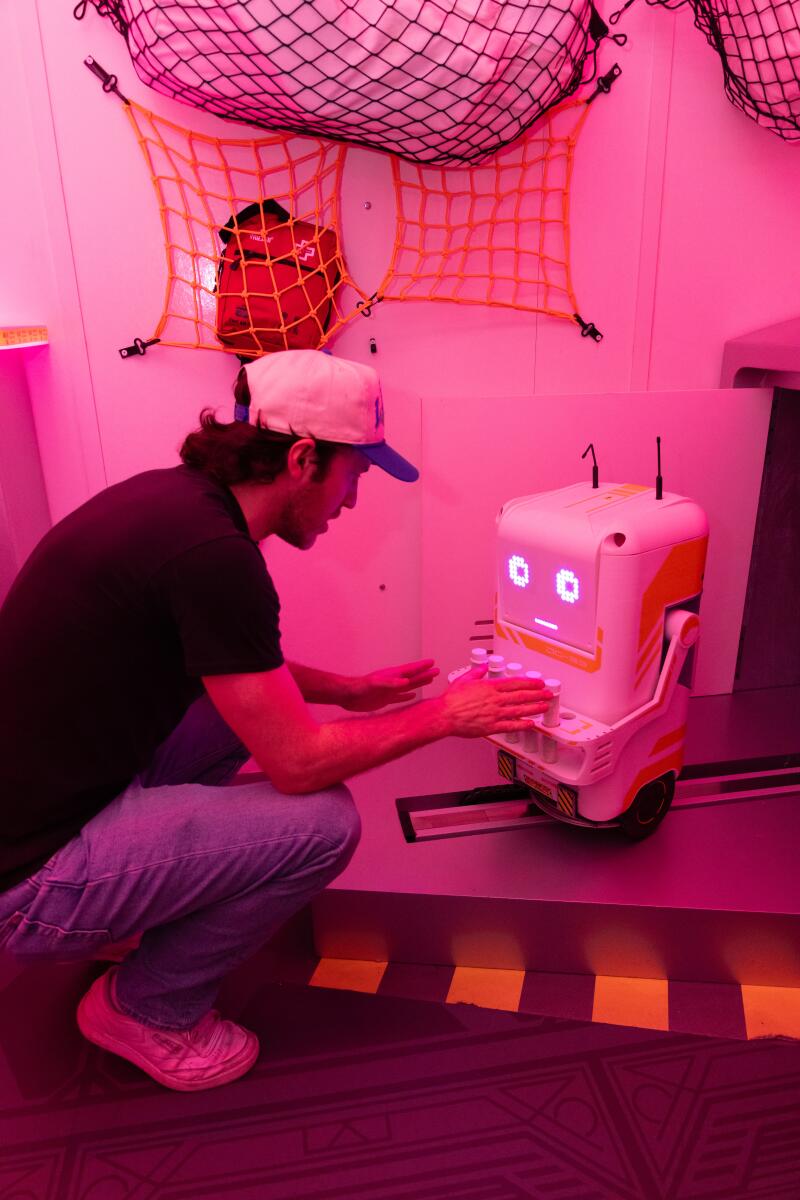
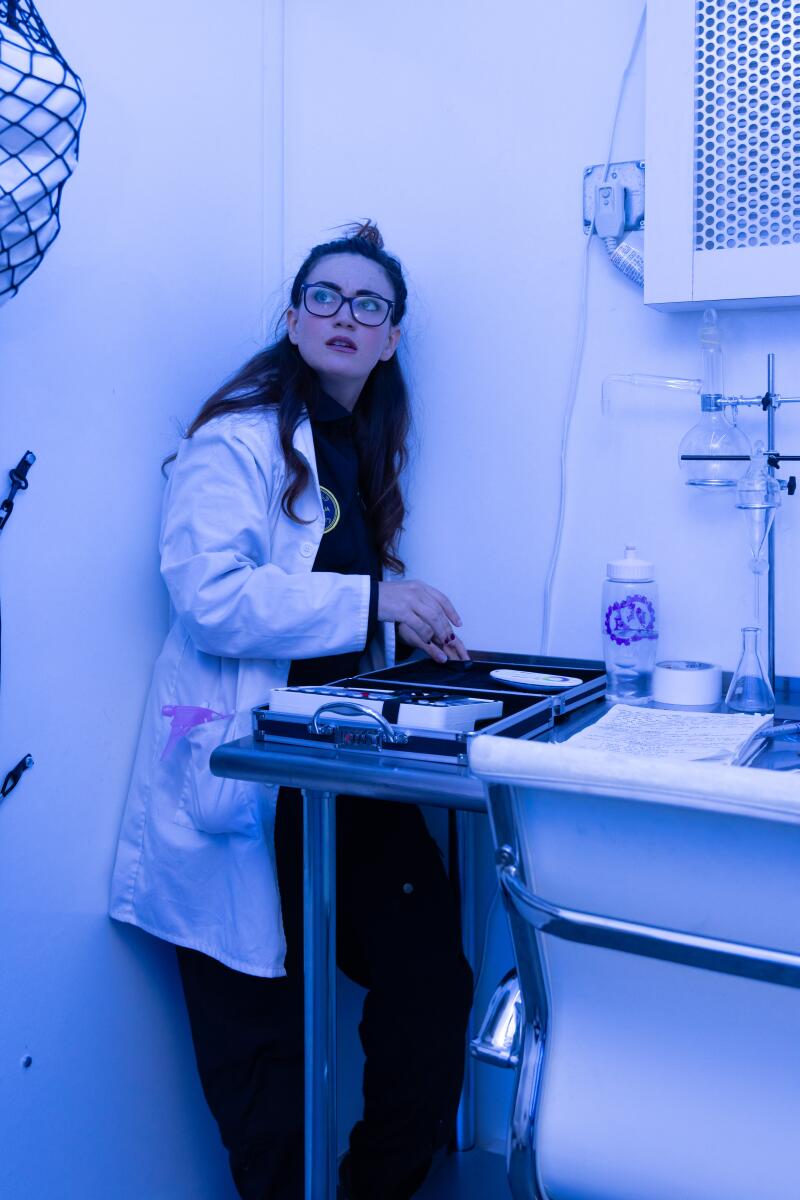
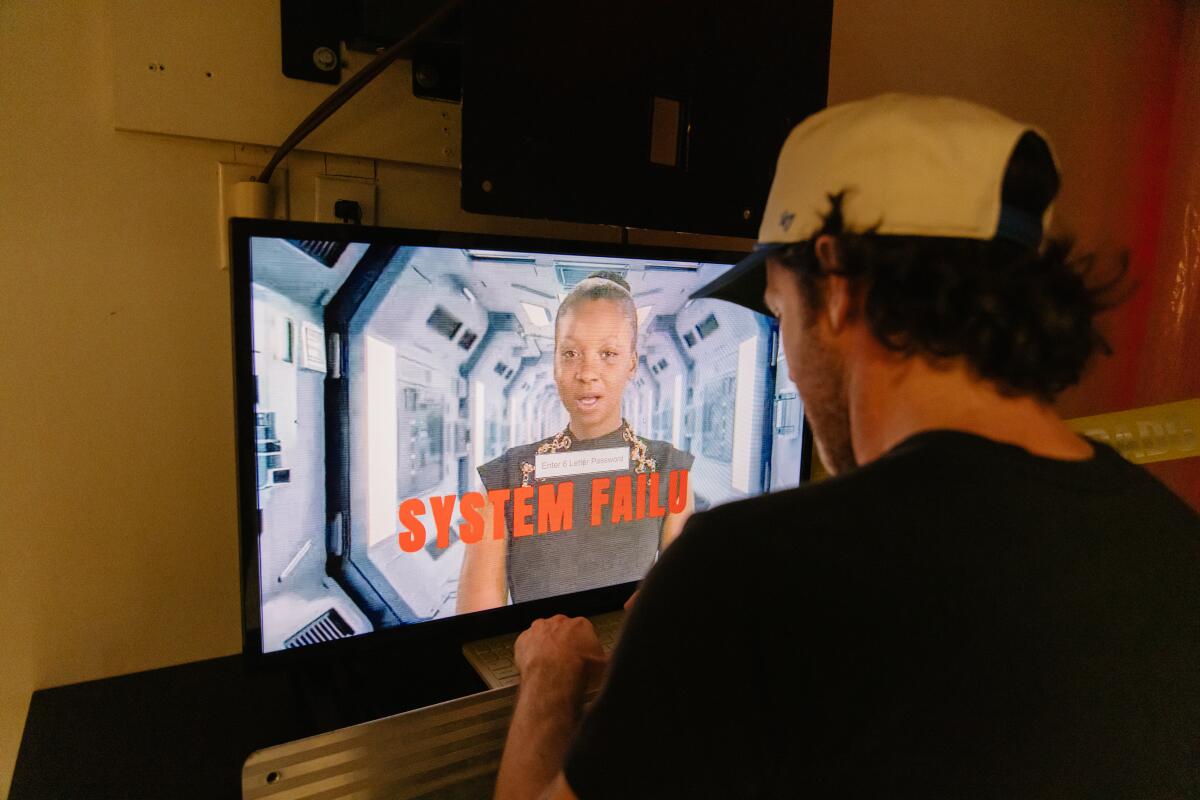
“The Lunar Light: Discovery” builds to a mini escape room-like puzzle.
(Catherine Dzilenski / For The Occasions)
The Santa Monica expertise, slightly longer than an hour, is simply in VR for a fraction of that interval. After a brief jaunt on the moon and a small gamelike exercise through which we mine for digital minerals, we discover ourselves in a lab the place we’ll play with numerous crystals. There’s a Tesla coil, and we are going to check out numerous electrical vitality reactions. The temper, nevertheless, isn’t that of a classroom, because the actor manning the lab performs the scene for laughs — all {that electrical} vitality is wreaking havoc on her thoughts.
Roosa, whose father was a navy pilot, moved typically all through her childhood, and she or he says she escaped through improv reveals like “Whose Line Is It Anyway?” That knowledgeable “Lunar Gentle‘s” lighthearted vibe, and after experiencing various actor-driven immersive theater shows, such as one inspired by Netflix series “Bridgerton,” she knew she didn’t need her area exploration expertise to rely solely on know-how.
“I think human-to-human contact is the only thing that’s going to save us in the world,” Roosa says. “Obviously I like VR, but I think the human connection is what makes the experience.”
“The Lunar Gentle Discovery”
“Lunar Light” makes an attempt to make use of VR to facilitate connection. Whereas within the headsets, we will see our fellow individuals. At instances, we‘re requested to high-five them.
“Let’s say there’s three different groups,” Roosa says, describing how strangers may be introduced collectively for the expertise. “They’re all timid. ‘I don’t know you.’ You put the VR headset on, and all of a sudden they’re high-fiving each other and jumping up and down. It’s almost like an equalizer. By the end of it, they feel like one big group.”
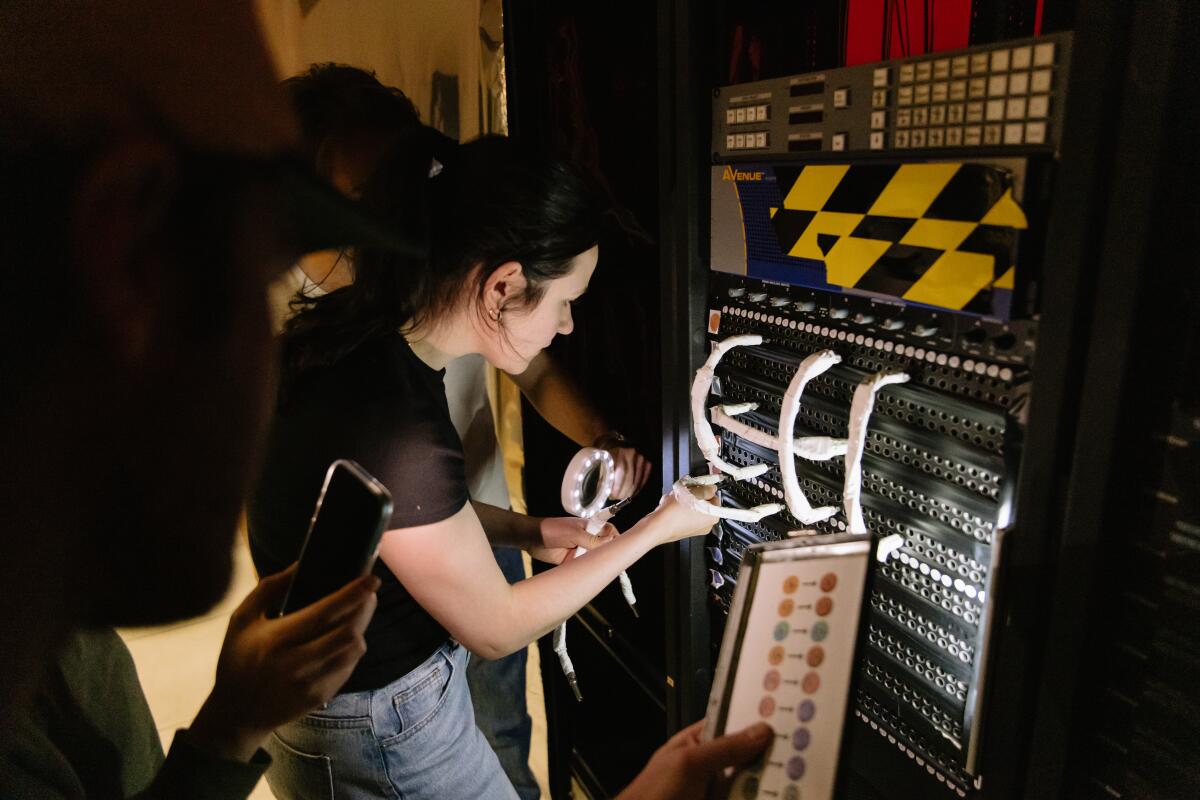
The puzzles in “The Lunar Light: Discovery” are designed with collaboration in thoughts.
(Catherine Dzilenski / For The Occasions)
Finally, “Lunar Light” builds to a mini escape room puzzle. However don’t anticipate something too tough. These evenly aware of escape room challenges ought to be capable of full it with out an excessive amount of of a fuss. Roosa didn’t need individuals to get caught, as her final purpose is creating pleasure round area by demystifying it.
Roosa says that many area experiences are “very serious.” She then briefly adopts an exaggerated, deeply male voice. “It is, ‘We are men of science.’ And I’ve always noticed, there is room for some fun. There is room for some comedy. I want people to feel a part of the space conversation.”
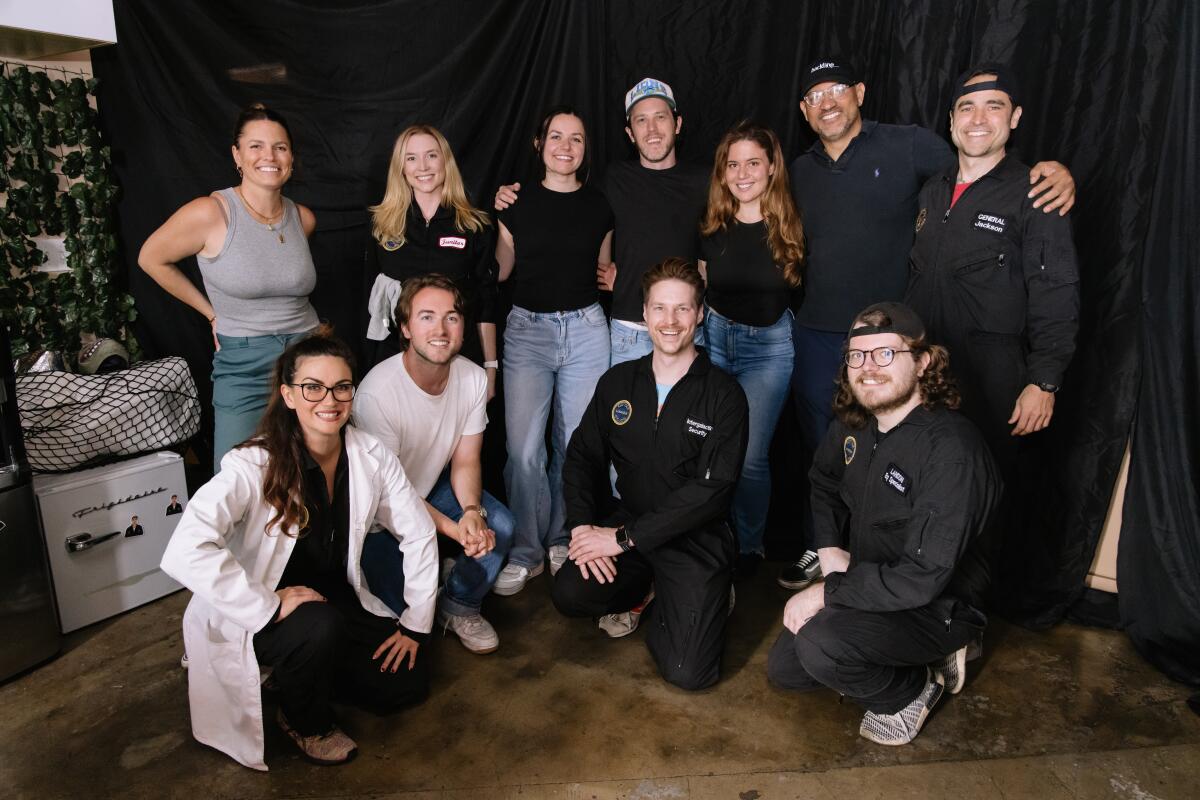
Danielle Roosa, second from left, again row, and Georgia Warner, Adam Kitchen, Derek Stusynski and Landon Gorton with company: Soren McVay, Max Cazier, Leanna Turner, Hannah Might Howard, James Cerini, and Eteka Huckaby throughout “The Lunar Light: Discovery.”
(Catherine Dzilenski / For The Occasions)



